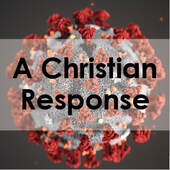 What does it really mean to be a servant of the Gospel of Jesus Christ in the age of coronavirus? How can we, as Christians, continue to let our light shine when darkness threatens to overcome it at every turn? As the coronavirus spreads throughout the world and the number of infected individuals seems to grow exponentially with each passing day, reactions have been wide ranging: from sheer panic to mild concern and even, in some cases humor. Governments are restricting or prohibiting travel. The airline industry is offering travel waivers. Concert festivals and conventions are being cancelled or postponed. Individuals are flocking to supermarkets and warehouse stores to stock up on toilet paper, hand sanitizer, tissues, and water bottles, all of which are now experiencing nationwide shortages that will disproportionally affect the poorest and most marginalized members of society.
With all the unknowns surrounding the virus, for many life has become a game of “everyone for themselves,” and the deep divisions that were already affecting our nation and our world have only grown deeper as chaos reigns and fear-based decisions outweigh logic and reason. The church has, of course, not been immune to this fear and confusion. Our primary purpose, gathering as a community for worship, fellowship, and service to our neighbors is exactly the kind of activity we are being told to avoid. Some of the ancient rituals of our liturgy (baptism, sharing of the peace, and Holy Communion, to name a few) are being called into question because their intentionally tangible nature makes them potential vehicles for spread of the disease. The temptation is to stay home, cease our worship activities and avoid fellowship and service opportunities. Who can blame us for wanting to protect ourselves and our families? It does, however, beg a question. What does it really mean to be a servant of the Gospel of Jesus Christ in the age of coronavirus? How can we, as Christians, continue to let our light shine when darkness threatens to overcome it at every turn? This isn’t the first time that the Christian community has been faced with the threat of pandemic. In fact, pandemic was one of the first issues faced by the early Christian community as the Antonine Plague killed more than five million people in the Roman Empire between 165-180 AD. Later, in 251-266 AD, the Plague of Cyprian affected the entire known world, killing half of all people who contracted the disease. Driven by fear, in both cases the wealthy and powerful in society retreated to quarantines in the countryside, leaving the poor, the sick, and the “less important” to deal with the disease on their own in the urban centers. For the early followers of Jesus Christ, however, the pandemics were viewed as an opportunity to take seriously the gospel call to serve and love their neighbors. As the world’s powerful fled, Christians overwhelmingly flocked into the cities to provide care, compassion, community, and love to those who had fallen ill. It was a radical and shocking act of witness to faith. Although they were motivated only by a desire to share the love of God through Christ with others, their actions cultivated a deep societal curiosity about the Christian faith that led to a marked increase in new believers that ultimately contributed to the development and spread of the church. It is, I think, not an overstatement to say that today’s church might look vastly different if it weren’t for their actions during these pandemics. Now to be clear, I am by no means suggesting that because we’re Christians we should throw caution to the wind and risk the well-being of ourselves and our families in our response to today’s threat. I am saying, that as Christians our response to coronavirus (and any other social crisis that may follow) should be, first and foremost, grounded in Jesus’ call in John 13:34-35: I give you a new commandment, that you love one another. Just as I have loved you, you also should love one another. By this everyone will know that you are my disciples, if you have love for one another. We have been freed through the life, death, and resurrection of Jesus Christ and so our call is to live lives grounded in love, not fear. So, what does this look like in the age of coronavirus? Maybe it means we take the time to learn new ways of sharing the peace (sign language, anyone?) and sharing Holy Communion, so that we can continue to receive the much-needed inspiration and peace that worship provides. Maybe it means we donate to the food pantry with renewed vigor, so that those in need do not have to worry about feeding their families on top of everything else there is to worry about. Maybe it means spending an extra few minutes each day in prayer, lifting up the concerns of our hearts and the concerns of our world to the God who was, who is, and who is to come. Whatever it looks like for you personally, in all things we should remember that our thoughts, words, and actions must always be grounded in love. We should follow the example of those first Christians and, when the world retreats in fear, respond with love, action, and service because, indeed, we know that the light shines in the darkness, and the darkness did not overcome it. May it be so in the age of coronavirus and in all the ages to come. Peace + Garth Englund Pastoral Intern
3 Comments
Larry Sweeney
3/12/2020 02:31:08 pm
Great, great message, Garth!
Reply
Ellen Allen Ms
3/12/2020 11:13:13 pm
Wonderful message!
Reply
Leave a Reply. |
Categories
All
Archives
July 2024
|


 RSS Feed
RSS Feed

